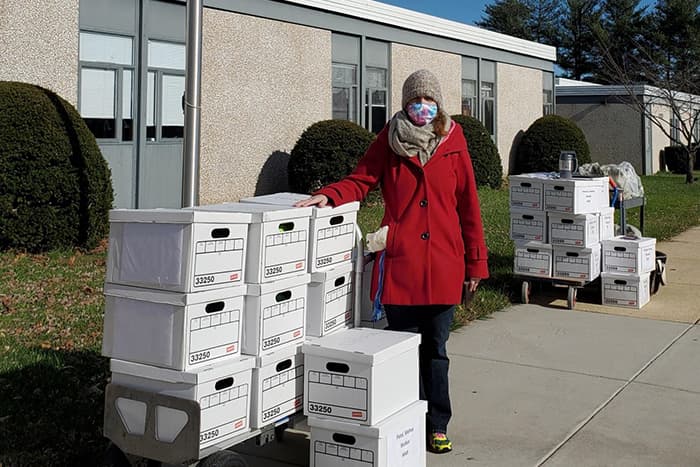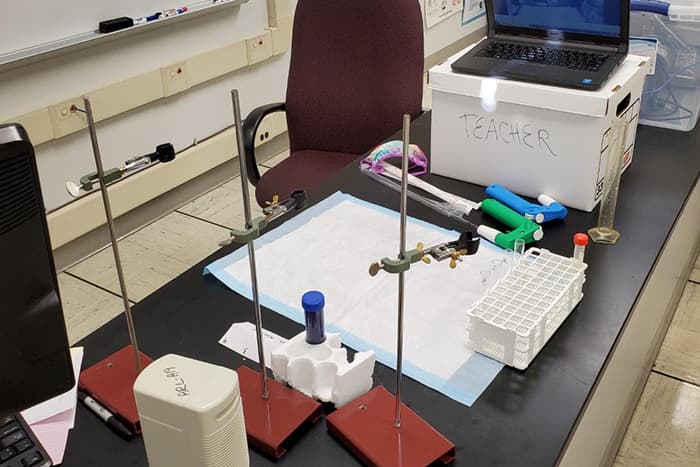Biotech Kits Enable Sophisticated Science at Home
March 18th, 2021

When schools abruptly closed due to COVID in March 2020, Alyson Donoghue, Jennifer Walker, and Cindy Kelly, teachers at HCPSS’ Applications and Research Lab (ARL) Biotechnology Academy, were in a bind. As much as they wanted to, there was no way for them to conduct their standard hands-on labs because students didn’t have access to lab materials and there was no process in place to get the materials to them. The best the teachers could do was adapt their lesson plans and have students watch as they, the teachers, performed some of the labs.
“We did the best we could with the limited options we had,” Kelly says. “But in order for students to really gain the lab skills and experience we wanted them to gain, we had to come up with a new plan.”
Over the summer, Donoghue, Walker, and Kelly did just that. They began to brainstorm lab activities that would teach students sophisticated science lessons and hand-on skills, but also respect the limitations of students learning while at home.
“We couldn’t assume that students would have traditional lab materials, like slides, beakers, Bunsen burners, or microscopes at home, so we had to figure out how we could make those materials available. And we had to ensure that whatever labs we decided to do could safely be done at home,” explains Donoghue.
From the group’s discussion emerged the idea of creating a series of biotech “kits” that the students could pick up and take home with them. Each kit corresponded to a different biotechnology instructional unit and contained materials such as beakers, pipettes, microscopes, and iodine that students would need to perform unit-specific labs. Each kit also contained safety equipment like latex gloves, googles, and a lab coat to help protect students while they were conducting experiments.

In total, Donoghue, Walker, Kelly, and paraeducator Kyle Decker assembled 130 kits and developed a process for students to pick up and return the kits to the Applications and Research Lab.
“We’ve made it really easy,” says Walker. “We have designated days where students can drop off kits from one unit and pick up the kits for the next one. All they need to do is show up and we (the teachers) take care of the rest.”
Although the kits have required a great deal of planning and preparation on the teachers’ end, they have been “totally worthwhile,” Walker says.
“When it comes to developing proper lab skills, there’s just no substitute for hands-on labs. That’s why the kits are so important. They enable the students to do the science and discover for themselves what works and what doesn’t,” Walker adds.
The kits have also been helpful in keeping students engaged in a virtual learning environment.
“When students have to measure, mix, heat and cool things, or look at something under a microscope, they are 100 percent focused. They have to be. They tune out distractions around them and give their full attention to the task at hand to get it right and be safe,” Walker says.
Throughout the labs, students are encouraged to have their cameras on, so teachers can easily monitor their actions and ensure that they are following proper safety protocols.
Donoghue notes that the end result of using the biotech kits has been satisfying for the teachers and students alike.
“The kits have made it possible for us to teach students important skills and prepare them for future science classes and careers in the biotech or other science fields,” she says. “And they give students a change from the structure of their other virtual classes. The kits get them up and moving and using their minds and hands together.”
Parents have also appreciated the kits, Donoghue says. “They have been grateful to have their students be so actively engaged, and for them to have the ability to build skills and have experiences that they would typically have in a classroom setting.”
Looking ahead, Walker is optimistic that when the time comes for students to return to in-person instruction, they will be ready to take their lab skills to the next level.
“Thanks to the kits, the students have been able to build their lab skills all year long. When they are physically back in the lab, they can focus on refining those skills and building new ones.”
At the same time, Donoghue says, the successful use of the kits has proven that sophisticated science can be safely and effectively done at home.
“We’ve done some amazing things – gram stains, forensic analysis, water sampling, just to name a few – all by providing students with a box of tools and putting simple household items to creative use.”
HCPSS appreciates the support of the Bright Minds Foundation and its Access to Learning Fund, which provided funding for the biotech kits and other at-home learning resources for students throughout the pandemic.
 HCPSS
HCPSS